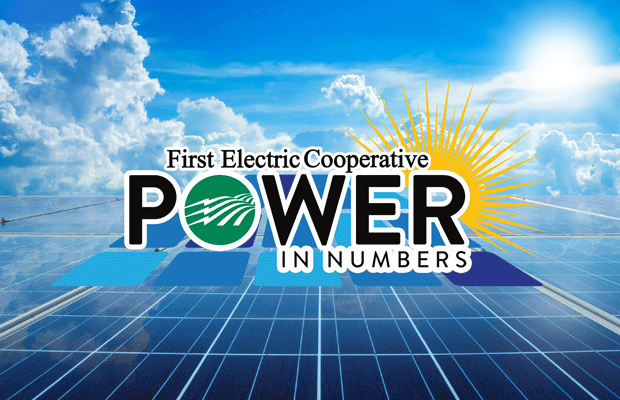First Electric: By The Number

First Electric Cooperative Corporation has been powering Saline County for more than 70 years. The first local branch office opened in Benton on South Street in 1950. Today, First Electric operates two offices in the county. It is the second largest distribution cooperative in Arkansas and one of the 33 largest of the nation’s more than 900 electric cooperatives.
First Electric is a not-for-profit electric distribution cooperative, incorporated in April 26, 1937, under the direction of the Rural Electrification Act as signed by President Franklin D. Roosevelt. It was the first electric cooperative in Arkansas, explains Vice President of Marketing and Development Tonya Sexton.
By the Numbers
First Electric energized its first power lines on April 15, 1938, near Jacksonville, with three employees and serving 150 members.
Now, First Electric serves more than 97,770 member accounts throughout parts of 18 counties in central and southeast Arkansas, Tonya says. The cooperative employs 216 employees across its five offices, and it owns and maintains more than 10,123 miles of distribution power lines, over 201,000 power poles and 46 substations.
The cooperative’s headquarters is located in Jacksonville, with four full-service offices in Bryant, Heber Springs, Perryville and Stuttgart. The Saline County member service office is in Bryant at 3230 Market Place, Suite 1, and the operations center is located in Benton at 8271 Congo Road.
First Electric’s Board of Directors comprises nine members representing its five districts. Karissa Rushing and Robert Maertens represent the Benton District.
Mission and Uniqueness
First Electric’s overall goal is to provide safe, reliable, affordable energy for its members, Tonya says. Safety is the top priority, and it is a lifestyle the company promotes and lives every day. “Our mission is to improve quality of life, which we have been doing for more than 84 years.”
First Electric belongs to those it serves—its members. “We are organized as a not-for-profit business and return capital credits to members on a recurring basis,” Tonya says. “With the 2020 capital credit refund of $9.56 million, the total amount refunded to members is now more than $124.3 million since the practice began in the 1940s.”
In addition, each year First Electric educates thousands of students and professionals on the dangers of electricity and how to work and play safely around it.
Going for Solar
First Electric launched Solar Services by First Electric in 2020 to offer residential solar to those in and near our service area. The company launched this service after recognizing the huge interest in renewable energy that exists today, says David Copeland, marketing and development representative for First Electric.
“For this reason, we see it as an opportunity to assist homeowners and make sure they fully understand the pros and cons of solar and ultimately what their electric bill will look like once they have solar installed.”
There are many factors to consider with solar, such as location, shading, array sizing, warranties, financing and more, David says. “For homeowners looking at solar as an investment, the precise rate you are paying for electricity must be used for accurate savings projections. Using national or regional averages will often result in a system that looks good on paper but truly is not worth the long-term investment.”
Location and Solar Energy
Solar panels need a clear view of the sun. For Arkansans, having panels that face the south is most preferable. Facing them any direction other than south can result in a considerable decrease in their ability to produce their maximum rated amount of power, David points out.
“If your home does not have enough ideal roof space for solar, a ground-mounted array is an option to consider. Having a ground-mounted array allows the solar panels to be ideally positioned to get the maximum power output throughout the year.”
Solar by the Numbers
Your home’s energy consumption must be considered to properly size a solar array. Failure to use historical consumption data can result in an undersized system that does not meet expectations, or an oversized system meaning you will have paid for extra panels that you did not need.
Solar will not eliminate your electric bill, says David. “Not unless you close your electric account and install solar coupled with enough battery storage to meet your needs 24 hours a day. There are costs associated with having electric service available to you 24/7, which are shared by all members of First Electric.”
For this reason, even if you install enough solar to offset your entire annual kilowatt-hour usage, there will still be a minimum bill from your electric provider, David adds. “The minimum bill is the service availability fee which is a fixed charge designed to recover the basic monthly costs of providing poles, wire, transformers, meters, billing, etc.”
First Electric offers free, no-obligation quotes. “Simply call, ask, and within a very short period, a custom quote can be prepared for you,” David says.










0 comments